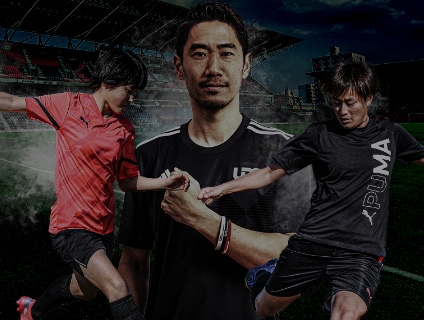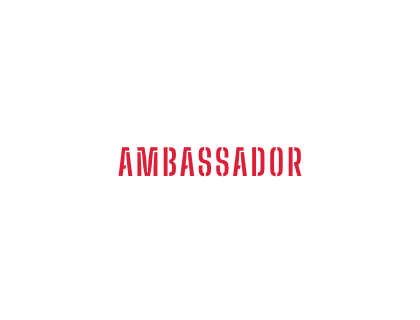
Kakeru Funaki,
Hiroto Yamada,
Hinata Kida's

“Our Driving Force Is Our Love for Cerezo”
Kakeru Funaki, Hiroto Yamada, and Hinata Kida Aim to Grow Using the Skills Cultivated in their Academy Days
Kida was the GK: Three players one year apart
There are currently 7 homegrown academy alumni registered on the Cerezo Osaka top team. This installment of “The Power of Cerezo Osaka Academy” will focus on three players: Kakeru Funaki, Hiroto Yamada, and Hinata Kida.
Funaki, Yamada, and Kida were each one year apart at the academy, with Funaki being the oldest at 24. The three players came up together in the academy, in which “there was no hierarchy in a good way” (Funaki), and they all experienced training transfers to other clubs. Now, they are all working hard on top teams to acquire regular positions. I spoke to these three players about what they learned during their time at the academy, as well as their current locations and goals.
Kakeru Funaki
 Cerezo Osaka
Cerezo Osaka
Born April 13, 1998. 24 years old. From Nara. 177 cm / 65 kg. Cerezo Osaka U-12 → Cerezo Osaka U-15 → Cerezo Osaka U-18 → Promoted to top team in 2017. Loaned to Iwata in 2020 and Sagamihara in 2021. Returned to Cerezo this season. An athletic left-handed left-back with a highly precise left foot. He will also play as center-back this season.
Hiroto Yamada
 Cerezo Osaka
Cerezo Osaka
Born March 7, 2000. From Aichi. 183 cm / 76 kg. Aichi FC → Hopeiro Kariya → Cerezo Osaka U-18. Promoted to top team in 2018. Loaned to Ryukyu in 2019 and Sendai in 2020. Returned to Cerezo in 2021. A striker who is also skilled as a forward with a keen sense for lay-offs, getting behind the defender, and goals.
Hinata Kida
 Cerezo Osaka
Cerezo Osaka
Born July 4, 2000. From Osaka. 171 cm / 59 kg. Cerezo Osaka U-12 → Cerezo Osaka U-15 → Cerezo Osaka U-18. Signed on as a pro in August 2018 of his 3rd year of high school from the youth team. Loaned to Fukuoka in 2019 and returned in 2020. A holding midfielder with solid footwork and build-up skills. He also plays as full-back depending on the team circumstances.

photo (left to right): Yamada, Funaki, Kida

- First, tell me about why you started playing football.
- Kakeru Funaki: My dad recommended it. I was kicking pinecones with my left foot on a family trip, and he said, “You could probably use that for football” (laughs).
- Hiroto Yamada: My elementary school was full of kids who had gone to the same kindergarten. I was the only one coming from a different pre-school, and my parents were worried about whether I would be able to make friends, so I joined the football team that everyone was on. It was to make friends.
- Hinata Kida: I started at my friend’s invitation in kindergarten when I was 4 years old, and then the Cerezo football school opened up near my house, so I joined.
- Funaki and Kida, you both started at the Cerezo Osaka children’s football school. Do you remember meeting each other for the first time?
- Funaki: We roomed together at camp once when I was in 6th grade and Hinata [Kida] was in 4th. But I don’t remember it very clearly. I mean, in my mind, Hinata was always a GK (laughs).
- Kida: There was no GK in the upper grades, so I did it for them.
- Funaki: At the time, we were separated by grade and didn’t interact a lot, so I thought that GK kid was a national [youth] team member” (laughs).
- Yamada, you started with U-18, didn’t you?
- Yamada: Yes. I was able to participate in practices because a club staff at my junior high had gone to college with Coach [Yuji] Okuma. I think Kakeru [Funaki] was there, too, but I don’t really remember. What I remember most is the last run of practice. I couldn’t keep up at all. I thought I had failed, but they called my name and I was so happy.
- I was put on the “A” team almost from the very beginning, and I didn’t have a lot of interaction with the older kids during my first year. In my 2nd year, Kakeru was 3rd year so there were more opportunities to talk to him. I first played together with Hinata [Kida] on the national [youth] team when he was still in his 3rd year of junior high. We met on the bullet train [to an away game]. I remember being together a lot on national team activities, with him and Ayumu [Seko / currently with Grasshopper Club Zürich] and Toichi [Suzuki / currently with FC Lausanne–Sport].
Our entire foundation was laid in a privileged environment
The three smile wryly as they recount “runs” being the most memorable thing from their academy days. Overall, it seems to have been a very tough environment. “It was our mental stamina that was trained the most,” says Kida. “We were already physically fit, but we improved our running ability,” reflects Funaki, suggesting that the physical conditioning developed in their training days is still proving useful to them as pros today.
In addition to physical growth, encounters with influential coaches during their formative years broadened their mindsets as players and expanded the scope of their playing.

- Are there any coaches who had a particular impact on you during your time at the academy?
- Kida: Definitely Coach [Terumasa] Kin. Since the time I joined [U-15] in my 1st year of junior high, he gave me the mental and physical foundations I needed to be promoted to U–18. He also changed my position from full-back to holding midfielder, which helped get me onto the national team, so he had a major impact on me.
- Yamada: For me, it was Coach Okuma and Coach [Kazuhiro] Murata during my time in U-18. I trained under Coach Murata for longer, so I was told some harsh things, but I’m glad to have had him as a coach.
- Funaki: Coach Kai Ohata and Coach [Tomoya] Takehana from elementary school made a huge impression. I trained under Coach Kai in 4th grade and Coach Takehana in 5th and 6th grade. The most memorable thing Coach Kai ever said was, “You don’t have to practice with your right foot. Just practice with your left foot and master it.” Coach Takehana said, “Don’t forget to have fun with football.” Practices were fun, and creativity was valued. I haven’t forgotten what they taught me and still apply it today.
- What did you learn, including things that helped you go pro?
- Kida: It laid the foundation. I think it comes down to that.
- Yamada: I started in high school, but the environment was wonderful. I was practicing right next to a top team, and I was even able to play on the U-23 team, so it was easy to get used to playing with the top team once I was promoted. It was quite a sudden change coming from a small town club, which helped get me into shape for the pros. In terms of playing, as Hinata was saying, the running groundwork was a huge part. As far as technique, we were taught to be able to demonstrate our skills in high-intensity situations, which is still useful today.
- Funaki: The fact that we were able to tour internationally was also big. There were challenges to be found when we went to Germany in my 2nd year of high school and played against a local team. We also went to watch a Dortmund match. It was when Shinji Kagawa was playing. It increased my desire to play in a place like that. It made me set high goals for myself, and I like having the ability to move up to the top team.
- As academy alumni, how do you want to be seen by current students at the academy?
- Kida: We grew up watching Yusuke Maruhashi. The training ground was right next door, and we were able to use the same gym, rehab facilities, and other facilities along with top players. Seeing how great the pro players are up close and thinking, “This is who I have to surpass” tightens your mental fortitude. I want to play in more games and work harder in order to become a role model like that for current students, so that they can watch me and learn.
- Yamada: I want to be someone they admire, like we admired Yoichiro Kakitani and Kenyu Sugimoto. For that to happen, we have to work hard. In addition to admiring us, I want them to also feel a kinship with us, and since they came up in Cerezo Academy, I want them to be successful with Cerezo. I still play with Sota Kitano now, and I hope we can keep working hard together.
- Funaki: Right now, there aren’t any Cerezo Academy alumni who are consistently in the starting lineup as mainstays, like there were when I used to go watch matches. I want to do my best even in practice in order to keep Cerezo’s player development going and make current academy students want to play for Cerezo professionally. I will do my best to take responsibility for this.
The force that drives them forward in the midst of a strong team
As Funaki says, no academy alumni have secured a place on the team for the 2022 season. He knows better than anyone that, in the pros, being an academy alumni does not necessarily mean that you will be able to compete in games.
“Competing in games.” This is a phrase that comes up often. Amidst the team's strong performance this season, what motivates these players?

- There were times when you were loaned to other clubs for training in order to gain game experience.
- Kida: I went to Avispa Fukuoka in my first year as a pro. It was during the time that Hisashi Jogo and Takayuki Morimoto were there, and I witnessed the awesomeness of first-class players, including how they prepare for practice. It was a great year.
- Yamada and Funaki, you experienced two clubs.
- Yamada: FC Ryukyu was my first loan. I wasn’t familiar with other clubs, so it was a good chance to learn about another club. Getting to play with Shinji Ono was a great opportunity, and I also got to play with Satoki Uejo. It was a lot of fun. Getting to play in a J1 game in Sendai was also a great opportunity.
- Funaki: I went to Júbilo Iwata and SC Sagamihara. I went to Júbilo right as the pandemic was starting, so it was a tough year. I couldn’t go out to eat, and had to do with takeout. Last year in Sagamihara, the environment was different compared to Cerezo and Júbilo. I became unable to compete in games mid-season and returned to Cerezo in that condition, so I started this season determined to work extra hard. Everything I experienced during those two years has encouraged me to work hard now.
- Funaki, you came back this season and played as full-back as well as center-back, and you have accumulated valuable experience in cups and league matches.
- Funaki: I feel like I have really broadened my scope. I like that all of the current team members are so dedicated to playing for the sake of the team. A lot of the players are willing to make sacrifices to make the team better. I think that's a step in the right direction. I want to work harder to that same end.
- Yamada: I scored goals several games in a row at first and got the opportunity to be a starter. I was extremely happy that I was able to score goals in important moments. As a team, despite injuries and a lot of reshuffling during the season, everyone continued to play for the team with dedication. We have this to thank for our current league ranking, and although we lost in the Emperor’s Cup, we made the top 8, and we made it all the way to the finals in the Levain Cup.
- What is your driving force as a football player?
- Yamada: My expectations of myself. I don’t think you can reach a high level or get better if you don’t always have expectations for yourself. Of course, sometimes I expect too much of myself and it backfires, but, in the end, believing in my own potential and telling myself that I can do more is my biggest driving force.
- Kida: Mine is the idea of becoming a football player who is admired. When I was a kid, Shinji Kagawa, a player whom I admired, came to the football school and took pictures with us. I want to become a player who can be admired in that way.
- Funaki: I’ve done nothing but football since I was young, so sometimes I feel like it’s the only thing I can do. I’ve truly been with Cerezo since kindergarten, so my driving force is love for Cerezo (laughs).
- Yamada: That’s a nice wrap (laughs).
- Thank you for your time. Lastly, what are your future prospects and goals?
- Yamada: To be widely known. Being a football player, I don't want to end up a nobody. I want to be a player who leaves a lasting impression by scoring goals during important games, getting results throughout the season, and winning titles.
- Kida: My goals are to become a player who can do anything, and who makes people think, “If we had this player, we could win the game.”
- Funaki: Mine is similar to Hinata’s. I want to be a player who can play anywhere. I want to be able to play any position at a high level. That’s my goal for the future. Also, of course, winning the J1 League for Cerezo.
- All: (clapping)

Cerezo Osaka, the power of the academy
 for the future
for the future
Cerezo Osaka Academy aims to develop world-class player. From Cerezo Osaka to the world.
"We want many beautiful flowers to bloom in the future."
We approach the driving force for such a future.


Athlete's

Why do top athletes keep challenging?
We approach the driving force of top athletes who continue to challenge.







